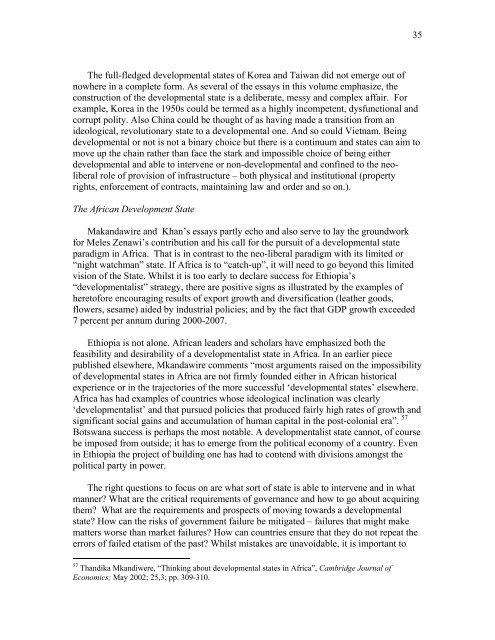Paper - Initiative for Policy Dialogue
Paper - Initiative for Policy Dialogue
Paper - Initiative for Policy Dialogue
Create successful ePaper yourself
Turn your PDF publications into a flip-book with our unique Google optimized e-Paper software.
35<br />
The full-fledged developmental states of Korea and Taiwan did not emerge out of<br />
nowhere in a complete <strong>for</strong>m. As several of the essays in this volume emphasize, the<br />
construction of the developmental state is a deliberate, messy and complex affair. For<br />
example, Korea in the 1950s could be termed as a highly incompetent, dysfunctional and<br />
corrupt polity. Also China could be thought of as having made a transition from an<br />
ideological, revolutionary state to a developmental one. And so could Vietnam. Being<br />
developmental or not is not a binary choice but there is a continuum and states can aim to<br />
move up the chain rather than face the stark and impossible choice of being either<br />
developmental and able to intervene or non-developmental and confined to the neoliberal<br />
role of provision of infrastructure – both physical and institutional (property<br />
rights, en<strong>for</strong>cement of contracts, maintaining law and order and so on.).<br />
The African Development State<br />
Makandawire and Khan’s essays partly echo and also serve to lay the groundwork<br />
<strong>for</strong> Meles Zenawi’s contribution and his call <strong>for</strong> the pursuit of a developmental state<br />
paradigm in Africa. That is in contrast to the neo-liberal paradigm with its limited or<br />
“night watchman” state. If Africa is to “catch-up”, it will need to go beyond this limited<br />
vision of the State. Whilst it is too early to declare success <strong>for</strong> Ethiopia’s<br />
“developmentalist” strategy, there are positive signs as illustrated by the examples of<br />
hereto<strong>for</strong>e encouraging results of export growth and diversification (leather goods,<br />
flowers, sesame) aided by industrial policies; and by the fact that GDP growth exceeded<br />
7 percent per annum during 2000-2007.<br />
Ethiopia is not alone. African leaders and scholars have emphasized both the<br />
feasibility and desirability of a developmentalist state in Africa. In an earlier piece<br />
published elsewhere, Mkandawire comments “most arguments raised on the impossibility<br />
of developmental states in Africa are not firmly founded either in African historical<br />
experience or in the trajectories of the more successful ‘developmental states’ elsewhere.<br />
Africa has had examples of countries whose ideological inclination was clearly<br />
‘developmentalist’ and that pursued policies that produced fairly high rates of growth and<br />
significant social gains and accumulation of human capital in the post-colonial era”. 57<br />
Botswana success is perhaps the most notable. A developmentalist state cannot, of course<br />
be imposed from outside; it has to emerge from the political economy of a country. Even<br />
in Ethiopia the project of building one has had to contend with divisions amongst the<br />
political party in power.<br />
The right questions to focus on are what sort of state is able to intervene and in what<br />
manner What are the critical requirements of governance and how to go about acquiring<br />
them What are the requirements and prospects of moving towards a developmental<br />
state How can the risks of government failure be mitigated – failures that might make<br />
matters worse than market failures How can countries ensure that they do not repeat the<br />
errors of failed etatism of the past Whilst mistakes are unavoidable, it is important to<br />
57 Thandika Mkandiwere, “Thinking about developmental states in Africa”, Cambridge Journal of<br />
Economics; May 2002; 25,3; pp. 309-310.














